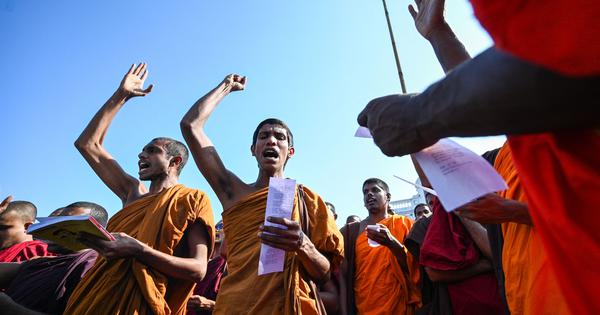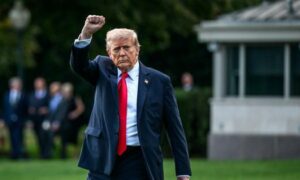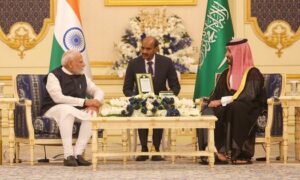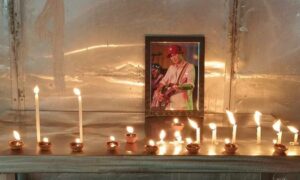
On the face of it, Ranil Wickremesinghe’s strategies, as Sri Lanka’s president from 2022 to 2024 helped the country gain credibility among its creditors during the economic crisis.
This is a claim made both by international observers and his supporters at home. For instance, the latest International Monetary Fund briefing on the country in March declares that “Sri Lanka’s economic reform program is delivering”, adding that “in a mere 18 months [the economy] recovered just under half of the output lost” from 2018 to 2023.
In some quarters, the perception is not only that Wickremesinghe delivered, but that he went beyond the call of duty to restore stability to a country that was on the brink of total collapse. As one member of his United National Party stated, “He stepped up and accepted the challenge to save the country when the economy collapsed.”
However, this narrative has been challenged by Wickremesinghe’s critics. They say that by assuming the premiership under Gotabaya Rajapaksa, and the presidency when Rajapaksa fled the country in 2022, Wickremesinghe undermined the massive protests that were on the verge of achieving “system change” and “saved the Rajapaksas”.
The differing perceptions of his role during the economic crisis is essentially reflected in the chasm now apparent in Sri Lanka following National People’s Power alliance’s election victories in 2024.
Wickremesinghe’s arrest in August on charges of misusing public funds on a private trip puts into focus a changing order and an uncertain future. (He was soon released on bail.) It also brings to the surface a deep-seated sense of frustration among Sri Lankans, about the price they have paid for the austerity measures that he put into place to combat the economic crisis.
This resentment has proved so intense that many are celebrating the National People’s Power campaigns against the old guard.
The stability that Wickremesinghe’s reforms achieved has come at a tremendous cost to welfare and social security. The austerity measures led to the prices of goods doubling – and in some cases, even tripling.
Condition of Sri Lanka is more dire than what it looks on the surface. The government is barely being able to keep things together.
A third of Sri Lankans live in poverty now 🇱🇰
People are being forced to eat what they once discarded as they can’t afford much else.… pic.twitter.com/pX642L2RNQ
— do’o kappa (@viprabuddhi) June 29, 2025
The backlash this generated, as the results of last year’s parliamentary elections show, had been brewing for a long time. In September 2024, Wickremesinghe’s United National Party was defeated by the leftist National People’s Power alliance, headed by Anura Kumara Dissanayaka.
“There [was] a perception among the people that corruption levels [had] risen,” Ranga Kalansooriya, a former Director General of the Sri Lankan Department of Government Information and a leading media academic, said in a documentary about the crisis,
That is why the recent arrests of not just Wickremesinghe and some ministers, but also public officials, have been welcomed by Sri Lankans – even those who supported Wickremesinghe’s reforms.
To be sure, there was always bound to be public discontent about such economic reforms in a country where education, health, and electricity are provided partly or completely by the government.
The sentiment among ministers from Wickremesinghe’s government today is that there was no alternative to those reforms. They claim that they knew it would cost them popularity, yet went ahead regardless.
This is precisely what precipitated a groundswell of discontent. It did not help that Wickremesinghe’s government hardly differed from the Rajapaksa administration that had led the country into the crisis in the first place.
What complicates the situation even more is that, though at variance with the opinion on the street, many policymakers have supported these reforms.
Some of them have questioned Wickremesinghe’s arrest as well. For instance, the Sri Lankan economist Ganeshan Wignaraja has said that “the grounds [on] which they have gone for [Wickremesinghe] seem quite minor”. This has been echoed elsewhere.
Several foreigners have also weighed in on the arrest. That should not come as a surprise. For a long time, Wickremesinghe was seen as Sri Lanka’s foremost international political figure.
Despite this, it is significant that none of the embassies and high commissions in Colombo has commented or issued statements about the case – a point which, one analyst says, shows that the proceedings are viewed as being fair at official levels abroad.
That has not stopped others from chiming in. Hours after his arrest, Indian Congress party MP Shashi Tharoor urged the Sri Lankan government to “abjure the politics of vengeance”. Echoing many Wickremesinghe supporters in Sri Lanka, he described the charges as “trivial”.
As expected, this provoked a barrage of angry replies, most of which took exception to Tharoor’s dismissal as “trivial” the Rs 1.6 crore Sri Lankan rupees (Indian Rs 48.5 lakh) that Wickremesinghe is alleged to have misused – in a country where the monthly median income (as of 2019) is roughly Sri Lankan Rs 53,000. Another more provocative tweet by a former Norwegian politician associated with Wickremesinghe also stirred a hornet’s nest.
Concerned about the detention of former Sri Lankan President Ranil Wickramasinghe on what, on the face of it, seem trivial charges. His health issues have already seen him taken to the prison hospital. I call on the government of Sri Lanka — while fully respecting that this is… pic.twitter.com/ojuEfEu4FG
— Shashi Tharoor (@ShashiTharoor) August 23, 2025
These divisions have, all in all, benefitted the National People’s Power government, which was elected on a massive anti-corruption mandate. Since coming to power, its MPs have repeatedly pledged to break free from the politics of the past and subject everyone to the brunt of the law.
While all living former heads of state in Sri Lanka have rung alarm bells about these claims, insinuating that they amount to a witch-hunt, the yawning divide between internationally acclaimed economic and policy reforms and increasing levels of poverty and inequality may well help the National People’s Power take its agenda forward – even as it continues those same reforms.
Its crusades against corruption have united as many people behind the National People’s Power alliance as cohesively as they have pitted mainstream opposition parties against it.
This is not to say that the National People’s Power has been beyond reproach. An incident earlier this month involving a group of party members storming and occupying a rival leftwing party office has cast aspersions on the government’s reputation.
Even some of those who support the verdict against the former president say that these arrests distract from the National People’s Power’s record on other fronts, in particular the economy and foreign policy.
To be sure, the challenges this government is facing are formidable. While economists have downplayed doomsday predictions about 2028, when Sri Lanka will start repaying its foreign loans, a recent downgrading of growth for 2025 by the World Bank points to a stagnating economy.
The government has resumed infrastructure projects and is planning a few more. However, the question is whether, in the face of an uncertain global economy, especially the Trump tariffs, the National People’s Power regime can achieve levels of development needed to spur what the think tank ODI Global, in its review of the country’s economy in July, describes as “transformative growth.”
Moreover, even as they cheer their government for prosecuting Wickremesinghe in this case, supporters of the National People’s Power say that the charges pale in comparison to many other allegations that face him and other politicians – including the Rajapaksas.
To give one example, Wickremesinghe was accused of running a torture camp at the height of a youth insurrection from the late 1980s and early 1990s. The Rajapaksas, meanwhile, have collected so many charges of corruption and war crimes over the decades that compiling them is difficult.
The problem in these cases is that none of the allegations has been proved in court. Wickremesinghe was brought before a commission in the late 1990s over the torture camp allegations, but nothing came out of it. The National People’s Power made several insinuations about the Rajapaksas stealing money in the run-up to last year’s elections, but members of the family have not yet been questioned about them.
The National People’s Power can claim, not unjustifiably, that those allegations were swept under the carpet – a crucial part of their anti-elite discourse. Yet, even considering this, it seems plausible that if they are not proven, or if they end up nowhere, or if the economy falters while the National People’s Power pursues these cases, the allegations will end up re-legitimising the political old guard.
If that happens, it seems likely that the biggest winner will not be Ranil Wickremesinghe – who is reported to be suffering from several health challenges and has not indicated whether he is returning to politics – but rather a scion of the Rajapaksas. That increasingly appears to be Mahinda Rajapaksa’s active, colourful, and controversial son Namal.
Of course, this is still just speculation. Despite Opposition parties banding together against Wickremesinghe’s arrest, there are too many ideological divisions between them for their show of unity to go forward. And no matter what one may say of Namal Rajapaksa’s prospects in 2029, when presidential elections are scheduled to be held, his family has been tarnished by so many allegations that it seems inconceivable how he can pull it off – especially when other Opposition parties also pillory him on social media.
But as the political analyst Dayan Jayatilleka observes, Sri Lankan voters tend to change easily. Whether they will go so far as to switch camps in 2029 is open to debate. Until then, the National People’s Power has the task of seeing the economy through and delivering on its political mandate.
If it fails this task, what was past and prologue could well become the future – and the old guard could well become the new.
Uditha Devapriya is an independent researcher, writer, and political and foreign policy analyst based in Colombo, Sri Lanka who has authored four books. He can be reached at udakdev1@gmail.com.
Rumeth Jayasinghe is an undergraduate at the University of Peradeniya in Kandy, Sri Lanka. He can be reached at rumethj17@gmail.com.
They are working on a publication on the 2022 economic crisis, the mistakes made and the lessons learnt. The book is slated for publication in 2026.
This is the second article in a two-part series on the implications of Ranil Wickremesinghe’s arrest. Read the first part here.
📰 Crime Today News is proudly sponsored by DRYFRUIT & CO – A Brand by eFabby Global LLC
Design & Developed by Yes Mom Hosting






